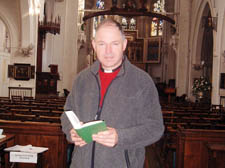|
|
 |
| |
| |

The Rev Robert Atwell with a copy of the English Hymnal |
Hymn book that spelt controversy for Percy
Interview: Rev Robert Atwell
St Mary-the-virgin
IF in contemporary Britain, a reserved parson from Primrose Hill decided to compile a hymn book featuring the most fashionable hymns of the age, the popular reaction is likely to be one of indifference.
But when Percy Dearmer, who was the vicar at St Mary-the-Virgin, in Elsworthy Road, decided to do just that with the young Ralph Vaughan Williams to create the English Hymnal in 1906, he caused a major storm.
Even the Archbishop of Canterbury, Randall Davidson, banned the book from his diocese.
But such opposition did little to prevent the hymnal from becoming hugely popular and influential.
“It’s amazing to think that a hymn book could be controversial,” Robert Atwell, the current vicar of St Mary’s The Virgin, says.
“It is hard to imagine how important hymns were in a pre-television age. The congregation here even had mid-week hymn practices.”
Dearmer, who grew up in Kilburn, studied at Oxford and was a committed Christian Socialist, became vicar of St Mary-the-Virgin in 1901 and he began to put his religious philosophy into practice.
According to Robert Atwell, Dearmer was distinctly uncomfortable with the hymn books of the age, such as the Ancient and Modern, as he felt they supported the social structures of Edwardian Britain.
Convinced a new hymn book was required he chose an unusual ally in Ralph Vaughan Williams, then a young man and an agnostic, to be the musical editor of the work.
It proved to be an inspired choice. Vaughan Williams, wrote new music, such as For All the Saints, referred to old English folk tunes and commissioned other composers to provide music.
For example, Gustav Holst was commissioned to write the music for In the Bleak Midwinter. The music was first tried out by the congregation of St Mary-the-Virgin and has since become a firm Christmas favourite.
What most upset the authorities, however, were the changes in the words of hymns.
Revd Atwell says: “I think one of the reasons he wanted this book is he had a great dislike for Victorian sentimentalism that could be found in books like Ancient and Modern.”
But perhaps most significantly were the words which reinforced the social and political class structure. It is hardly surprising that he removed the verse from All Things Bright and Beautiful which reads:
“The rich man in his castle,
The poor man at his gate:
God made them high and lowly,
And ordered their estate.”
When the book was published on Ascension Day in 1906 it had dramatic impact. Almost immediately the editors of Ancient and Modern embarked on a new edition.
The book remains in print and in use in churches across the country.
Revd Atwell adds: “Great music sustains you because it has a depth that is so profound.”
For anyone wishing to read more about the history of the book, Robert Atwell has written an excellent essay that is published on the St Mary-the-Virgin website, www.smvph.org.uk.
|
 |
|
|
 |
|








